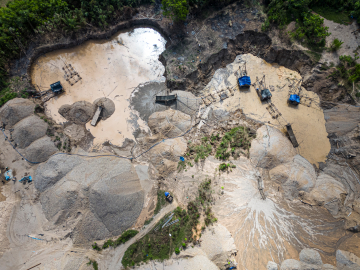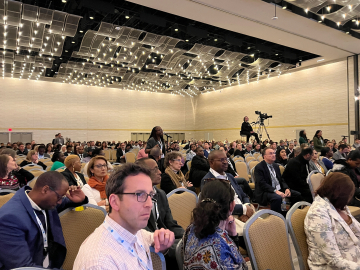5 Reminders for the G7 Towards a Secure and Sustainable World
When the G7 and heads of intergovernmental organizations come together today in the beautiful Charlevoix region of Quebec, there will be one goal in everyone’s mind: Build a more sustainable, equitable and secure world.
Canada’s Prime Minister, Justin Trudeau, has outlined the priorities of the G7 (including Canada, France, Germany, Italy, Japan, UK, USA) meeting: investing in growth that works for everyone, preparing for jobs of the future, advancing gender equality and women's empowerment, working together on climate change, oceans and clean energy, and building a more peaceful world. Advancing women’s empowerment and gender equality in itself has a domino effect on enhancing global prosperity and security.
Here are our 5 key areas that we hope the G7 leaders will keep in mind as they deliberate:
- Investing in women entrepreneurs is essential to boost global economic growth: As the G7 heads of state discuss ways to boost economic growth, we hope that they remember why investing in women is “smart investment.” Multiple reports have demonstrated that gender equality pays major dividends when it comes to economic development. Furthermore, women are known to invest twice as much into their communities and families. Apart from representing 50% of world’s consumers, women entrepreneurs are growing at a remarkable pace—out of necessity, in some countries, due to the lack of opportunities in the formal sector. In Nigeria, for example, 41% of entrepreneurs are women, most of them in the informal sector. While women entrepreneurs are rising at a remarkable pace, their growing participation brings with it an opportunity to scale-up wealth creation, job creation, private sector development, and a reduction in gender inequality. However, gendered barriers such as access to funding and uneven distribution of family work remain major obstacles preventing women from achieving their true potential in boosting economic growth.
- When the gender pay gap closes, the world benefits; it is smart economics: We are excited to see the advent of Gender Equality Advisory Council for Canada’s G7 Presidency. We hope the G7 will take endorse and work to implement the Council’s recommendations to “Make gender inequality history.” Particularly, as the G7 discuss gender aspects of building a secure and sustainable world, we hope they discuss the issue of gender pay gaps and gender parity in senior leadership across sectors. As per a recent World Bank report, gender inequality in earnings per capita could lead to a loss of $23,620 per person globally. According to the report, gender equality in earnings and closing of the gender pay gap could add $160 trillion to the global economy.
- The rationale for gender parity when preparing for jobs for the future is strong: The future of human capital has strong gender dimensions, and tapping into the female talent pool is a promising area as we prepare for the future. In fact, women’s rising labor force and economic power as consumers will be key drivers of change across sectors. There is both a moral imperative and an economic case to engage more women in formal workforce at all levels. Even as the number of women in health and the STEM (Sciences, Engineering, Technology, and Management) fields is increasing, we are not seeing the same growth reflected in senior positions. In fact, women are among the most under-utilized human capital resources, untapped or wasted due to lack of career advancement. Reports suggest that while women are more educated than men on average, their chance of acquiring leadership positions is 28% to that of men. As the G7 countries discuss preparing human capital for the future, we hope the discussions will yield solutions on how the world can better leverage female human capital.
- Leveraging women as drivers of change for inclusive disaster risk reduction and climate change adaptation: When it comes to inequality, climate change and disasters are gendered vulnerabilities. While women constitute a majority of the world’s poor, they are also more reliant on informal trade, and natural resources for their livelihoods—hence, they are at a greater risk to the effects of both climate change and disasters. Further, more traditional roles as caregivers and socio-political-gender norms can often increase their vulnerability and coping capacity to health emergencies and disasters respectively. Internal displacement and external migration due to conflict, climate change, or disasters also renders women vulnerable to gender-based violence. However, as 50% of the global population, women can also serve as change-makers and leaders in climate change adaptation and resilience to health emergencies. In 2018, we hope G7 countries will take into account not just women’s needs and priorities in the anthropogenic era; but also, how to leverage the human capital, knowledge, and resources of women to enhance climate change adaptation. While there is a need for gender-sensitive indicators, sex-disaggregated data, and policies that reduce inequality in access to resources in response to disasters and emergencies; there is also a need to implement capacity-building measures for women to enhance climate change adaptation.
- The SDG road for health leads to universal health coverage, and women will deliver it: Any talk on health for all needs to take into account the key role of women health workers in providing care to over 5 billion people. To achieve the Sustainable Development Goal for health, over 40 million new health care jobs will be needed by 2030. Investment in SDGs, especially with respect to universal health coverage, will require attention to women in the health workforce. We hope the G7 countries will take into account the crucial role women play at the frontline of health care, and work to ensure gender parity in compensation and leadership at all levels.
Needless to say, our success in building a prosperous, secure, sustainable, and equitable world will depend a lot on our investments in women and by women through promoting gender equality.
Sulzhan Bali (@sulzhan) is an independent international development consultant specializing in global health. The views in this article are the authors’ alone and do not represent the views of the organizations with whom they work.
Roopa Dhatt (@RoopaDhatt) is the co-founder of Women in Global Health.
Ann Keeling (@annvkeeling) is a Senior Fellow at Women in Global Health, and the founder of NCD Alliance.
Join the tens of thousands of subscribers who rely on Global Health NOW summaries and exclusive articles for the latest public health news. Sign up for our free weekday enewsletter, and please share the link with friends and colleagues: http://www.globalhealthnow.org/subscribe.html
Fairmont Le Manoir Richelieu in La Malbaie, Quebec, Canada, where world leaders gathering for this weekend's G7 summit will stay. Daniel Slim/AFP/Getty Images




